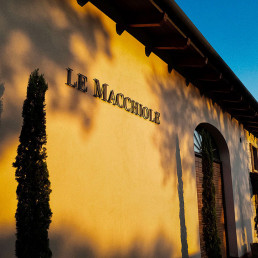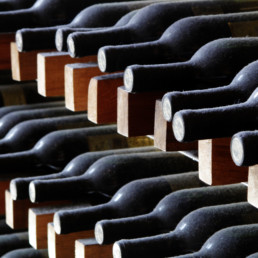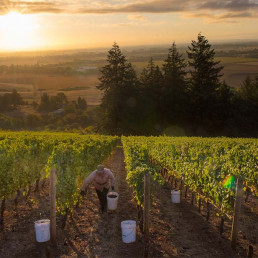Parés Baltà: Scintillating Spanish New Wave Wines
Mas Vino Por Favor!
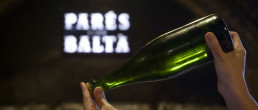
Is there no end to the energy and brilliance of Parés Baltà’s wines and the creativity of its female winemakers. Absolutely not! There seems to be an unspoken obsession with pure expressions of terroir that really sets this estate apart. Each and every one of the Parés Baltà wines is distinctive, expressive, and stunningly scrumptious; not to mention, that their entry level Cava is multi-award winning and about the best value Methode Traditionnelle on offer.
Obviously, we couldn’t hold out any longer! Dhall & Nash has nabbed another trio of their new wave still wines which are unfailingly brilliant.
Tasting these new wines demonstrated to us how the Parés Baltà team manage to combine all the right elements to achieve a balance of energy, complexity and drinkability that is nothing short of wine nirvana. Taste & see!
At Parés Baltà the focus is on seamlessly marrying the incredible purity of fruit with the primacy of their unique terroir. At the risk of sounding like a hard sell, you should go deep on this offer to give your palate a welcome blast— these are amongst the most transparently luscious and great value wines out of Spain. No question!
Parés Baltà
Delivering terroir-true excellence
The Distinctive Wine Region – of Penedès D.O. is tucked away between coastal hills, south-west of Barcelona in Catalonia, and to the north-east of the other historic winemaking region of Tarragona. Penedès’s fame historically rests chiefly on its Cava sparkling wine (which was granted its own Denominación de Origen in 1991). Cava sparkling wines must be made according to the “Traditional Method” (secondary fermentation in the bottle like champagne) and are required by law to have a minimum of nine months’ bottle ageing following the fermentation. Over 90 percent of Spanish Cava comes from the Penedès region. Generally, white grape varieties dominate here, but the region also offers a host of well-made red wines as you’ll discover from the forward-focused Parés Baltà Estate.
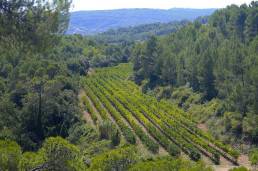
The Parés Baltà Story
Great Wine. It takes Generations.
The winery, located in the town of Pacs del Penedès (close to Barcelona), has a long winemaking history, having been founded in 1790 when the first vines were planted on the estate that now surrounds the winery. Today however, more than 230 years later, a lot has changed.
In 1978, Mr Joan Cusiné Hill took over the winery. Born in 1917 in Bellvei del Penedes, Mr Joan Cusiné Hill came from a family of grape growers and, already from the age of seven, he helped his father to cultivate the vineyards and never stopped working. Even into his 90s he was helping his grandsons care for parts of the vineyard.
His son Joan Cusiné Cusiné started to manage Pares Balta in the 1980’s and released its first still white wine, “Blanc de Pacs” which is still produced today. At the end of the 80’s the first red wine from the company was produced.
Then it was time for the next generation to bring more innovation. Since 2000 the winery has been managed by Joan and Josep Cusiné Carol, grandsons of the company founder. However, it was the changes brought about by the women they married, winemakers Maria Elena Jiménez and Marta Casas, that has shot them into the vinous stratosphere.
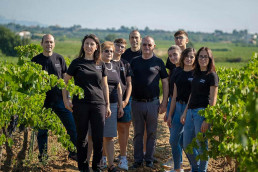
Josep’s wife, Marta Casas, and Joan’s wife, Maria Elena Jimenez, both came to winemaking by way of science; Marta had trained as a pharmacist before switching to oenology, and Maria Elena had been a chemical engineer. These two extraordinary women started work at the winery – in 1999 and 2002 respectively – having retrained as oenologists at Tarragona university.
When Marta and Maria Elena arrived at the winery, the family was just doing a few still wines but more focused on volume than quality. They started gradually changing methods of viticulture, winemaking, and blending styles. They made a quiet revolution take hold at Parés Baltà winery. Even though they have brought new and fresh ideas into the company, they have also shown respect for its traditions and protected the estate’s heritage.
Ultimately, encouraged by the Cusiné family and together with her sister-in-law, Maria Elena, Marta spearheaded a revolution in winemaking practices, prioritizing wines that honoured the unique terroir, aiming for maximum character and identity.
Today, Pares Balta produces a wide range of high quality wines and cavas that has been both nationally and internationally acclaimed. Always keeping quality in view, their aim is to produce some of the best and most representative wines in the world.
“It takes more than great grapes to make a great wine.”
– Joan Cusiné Carol, Winery Co-Proprietor
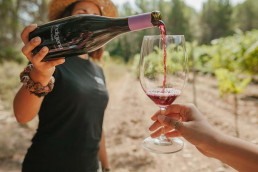
Parés Baltà believes that great wines can also convey great emotions. Because of this, the winery strives for an organic, minimal intervention process in order for the grapes to truly present the culture and traditions of the region. In this way, each of their wines is a fascinating, yet importantly, a delicious study in terroir.
Our passion for nature has always been the primary driving force to grow our vines organically, certified since 2002, and biodynamic since 2012.
– Parés Baltà Website
The New Wave Wines
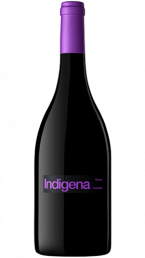
Parés Baltà Indigena 2021
“Very approachable. Again 100% Garnacha, [ ] fermented on the skins for a number of weeks [ ]. Floral hints of potpourri on the nose. Dark chocolate, cassis, baking spices, black berry fruits. Medium tannins and a long, dry finish.”
Phil Parker, Wine Reviewer, Ponsonby News
At the Parés Baltà Les Torres estate, at the top of the Penedès, they have individuated a unique vineyard site that produces the freshest and sweetest Grenache, a worthy hero for this single varietal wine. Following their estate commitment, this 100% grenache is grown organically and biodynamically. Its resistance to extreme temperatures and its easy adaptation to poor soils make it a perfect variety for making quality wines in the Mediterranean climate. Versatility is another of Garnacha’s strengths, which is why Parés Baltà are fans of it.
On the nose, there’s a range of wild red fruit accompanied by subtle toasted touches due to its brief stay in wood.The importance of the fruit is also evident on the palate, leaving a good trace of its elegance and smoothness. Its personality invites you to taste it and to repeat.
Winemaking – The grapes are harvested by hand and after receiving the grapes in the winery, they are gently pressed and fermented at 20ºC in stainless steel tanks for 2 weeks with 3 daily remuage. Indigena Red is aged in new and second year French oak barrels for little time so as not to add too much wood and to maintain its characteristic fruity touch.
“Intensely fruity, fine-grained, and very balanced. It will age well but is already perfect for drinking now.” 17/20
Julia Harding, Master of Wine, Jancis Robinson.com
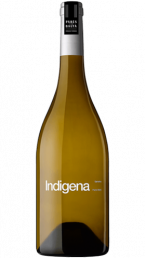
Parés Baltà Indigena Blanc 2022
“Indigena Blanc 100% Garnacha blanca “grown organically and bio-dynamically in vineyards in the Penedès. Bone dry, lean, and crisp, with tannic grip and spice from ageing in a mixture of new and old French barrels. Gooseberry, green bell pepper and herbal thyme.”
Phil Parker, Wine reviewer, Ponsonby News
A 100% White Grenache grown organically and biodynamically, in the highest areas of the Penedès, at an altitude of over 600 metres above sea level. A single varietal that manages to extract all the expression of the freshness thanks to the altitude where it grows. The winery’s oenologists, Maria Elena, and Marta, carry out a minimum of intervention in the cellar to keep its full potential and natural qualities intact.
In this vintage of Indigena Blanc, flowers and white fruit are complemented with citrus and creamy notes due to the months long lees contact. A wine with a delicate balance between freshness and vivacity. On the palate there is volume, balance, and it has a long lingering finish.
Winemaking – They harvest the grapes by hand and after receiving the grapes in the winery, they undergo a maceration of 4 hours, the grapes are gently pressed and fermented in a stainless steel vat for 20 days at an average temperature of 16°C. After fermentation, the wine remains in contact with the fine lees from the previous fermentation for approximately 3 months with daily bâtonnage. The wine is aged in new and second year old French oak barrels.
“Very ample and citrusy drink, with very rich acidity.”
El Diario, Elisabeth G. Iborra, Wine journalist
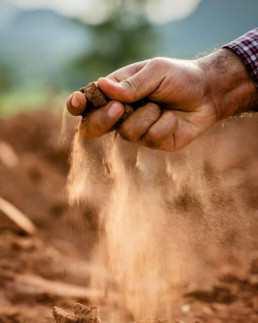
Amongst The Vines & In the Soil
Alongside an emphasis on tradition and quality, the environmentally respectful cultivation of the vines is key to Parés Baltà’s sense of identity.
The vineyards of Parés Baltà span five premium estates, covering 176 hectares of carefully cultivated, low-yielding vines. They are spread out across a wide variety of soils and each experiences a slightly different climate. As the microclimates and soils favour each grape variety differently, it is a complex and challenging task the Parés Baltà team faces to find the environment that gives the vines the best conditions to develop their unique personalities and vinous traits.
This current generation of vintners is turning to old ancestral grape varieties, better adapted to their land and environmental pressures. “We are working with varieties to fight against climate change,” says winemaker Marta, “we realise we have jewels with our ancestral varieties.”
In the hills of Penedés, Parés Baltà’s vineyards sit at altitudes ranging from 170 to almost 800 metres and they are only 10 kilometres from the sea. In the highest vineyards, thermal air currents and considerable diurnal temperature fluctuations allow the grapes to ripen slower and they are often harvested 4-6 weeks later than grapes grown in vineyards at lower altitudes. Vineyards planted on terraces along the Foix river have an entirely different set of conditions, with their own set of challenges and their own distinctive styles of wine.
There is also a significant diversity of soils, including calcareous, clay, and areas with important quantities of marine fossils. The soils of Parés Baltà’s best vineyards are generally poor in quality and have very little organic material but with biodynamic viticulture this has improved. The area with marine fossils is closer to the Mediterranean Sea, and millions of years ago it was under water. This type of soil is characterised by its permeability, and it retains little water. That makes the vines work hard to find water by sending roots deep into the earth, producing small quantities of grapes that are high on flavour, complexity, and concentration.
Over the last 20 years, the Pares Balta estates have benefited from a rich biodiversity thanks to the different cultivation and fertilization methods that they practice. To achieve the maximum vitality of their vines they use Biodynamic Preparations, they work with cover crops, promoting biodiversity, and they integrate animals into the work in the fields, such as a flock of sheep and goats. They also use bees to help vine pollination and create a more sustainable world.
– Parés Baltà Website
Biodynamic Commitment: the Parés Baltà Philosophy
All of their wines are certified as organic, and all of their vineyards are Demeter certified as Biodynamic. As part of their commitment to improvement, in 2011, the first biodynamic compounds were used on some experimental plots. One year later, the excellent results encouraged them to extend the practice to their entire vineyard holding. Biodynamic farming seeks to provide maximum vitality, self-balance, and harmony to the vineyard. They utilise biodynamic preparations and homeopathic remedies to help convey the influences of the cosmos to the vineyard. Whether you believe in such things or not, it has been shown to result in higher fertility, hardier vines, natural pest control and it is an internationally proven form of agriculture based on biodiversity and astronomy.
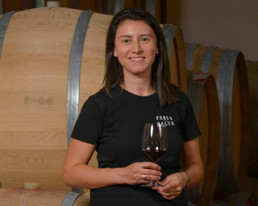
Marta Casas, of Parés Baltà was awarded the prestigious title of this year’s ‘Winemaker of the Year’ by the renowned British wine writer Tim Atkin MW, in his recently released report on Catalan wines ‘Special Report Catalonia 2024’.
The wines at Parés Baltà and Gratavinum are made with minimal intervention. “We are working with very low SO2 levels. We are also doing some wines without any sulphites at all,” says Joan Cusiné Carol. “We believe that drinking wine should be a nice, pleasant experience, and also a healthy one.”
Parés Baltà’s winemaking prowess shines through in its use of a diverse range of grape varietals. As well as making Cava, “we put big energy into our still wines. We like to be innovative and to investigate the research, but at the same time, learn from our ancestors.” For example, the winery vinifies in stainless steel, some barrels and demijohns, but, since 2011, also in clay amphorae.
This isn’t some modern fad they’ve adopted. Cusiné Carol says that in the upper part of one of the vineyards, kilns dating back more than 2,000 years had been found. They were for making amphorae which in Roman times would’ve been used to store and ship wine, oil, and honey.
Working with the clay vessels has opened up new winemaking possibilities. “We realised that, depending on the amphora type and how the clay was cooked, the wines tasted different.” What a happy coincidence to then utilise this newly discovered legacy to reveal another element of their terroir.
“Wines made sustainably are true ambassadors of their terroir”.
Jordi Fernandez, Co-Owner & Winemaker of Gratavinum
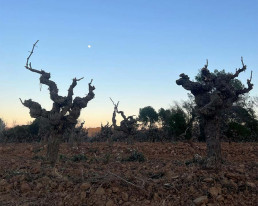
The Gratavinum terroir of organically-farmed terraced vineyards, are rich in Llicorella. This is the Catalan name for a special type of soil in Priorat, which consists mainly of reddish-black slate with small particles of mica quartz, with the different layers of soil being filled in by clayey soil. It is a rock formed over 1000’s of years of compacted sediments providing a distinctive mineral character to the wines of the Priorat region. Undoubtedly the nature of the Llicorella is part of the magic of these wines.
Jordi Fernandez unsurprisingly is enamoured by the singularity of this land, saying “You can taste the unique footprint of Priorat in the wines. Beyond the fruit, there’s minerality – smoke, graphite, wet leaves, and forest floor – the kind of earthy smell you get when it rains in Priorat. Each time I taste my wine, I can taste the terroir.”
“After several years of organic viticulture in both Penedès and Priorat, we had understood the link between the environment and the vines. We did the course in biodynamics with a ‘let’s see’ attitude, but it changed our lives – here was a whole new world.”
Marta Casas, Winemaker
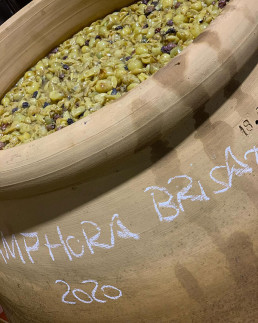
The Other Passion Project – Gratavinum
Whilst studying oenology at Rovira Virgili University in Tarragona, a young Jordi Fernandez became firm friends with fellow students Marta Casas and Maria Elena Jimenez and later, their husbands, brothers Josep and Joan Cusiné of the Parés Baltà winery.
The group of friends bonded over environmental concerns, and wine travel and on an impulse, decided to make wine together in the highly regarded wine region of Priorat. They managed to find adjacent plots of land beyond the village of Gratallops, and today are proud owners of 17 hectares, including some old, terraced vineyards (costers) and the winery which they built from scratch.
Thus, in 2003 Gratavinum the passion project was born. The name comes from the contraction of Gratallops (the village where the winery is located) and Vinum, which means wine in Latin, in homage to the Romans, who introduced the cultivation of vines in the region many centuries ago.
Jordi Fernandez now heads Gratavinum. Meanwhile the other friends-business partners focus on Parés Baltà in the Penedès. Then all five come together to decide on the final blends for Gratavinum which now makes 20,000 bottles of biodynamic wine annually, split over 5 labels.
Coincidentally, the group’s curiosity about biodynamics lingered long after they finished studying oenology, and in 2010 they found themselves attending a workshop by biodynamic certification agency Demeter. The group began preparing to go biodynamic – the Cusines at their winery, Fernandez in Gratavinum. Certified organic in 2003, Gratavinum got its biodynamic certification from Demeter in 2014.
“We are giving life back to the soil – enhancing life in every form, above and below the ground,’ he says, ‘Does that make the wine taste better? I think so”
Jordi Fernandez
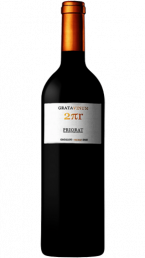
Parés Baltà Gratavinum 2ΠR 2021
A blend of 65% Grenache, 25% Carignan, 10% Syrah + Cabernet Sauvignon cultivated applying biodynamic farming in their vineyards in the Priorat.
In the crafting of this wine, the team at Pares Balta with partner Jordi Fernandez, have brought the unique character of Priorat terroir together with the softness, balance, and fruitiness of their grapes.
Tasting Note – Aromatic intensity and complexity with explicit presence of preserved red fruit well balanced with the touch of toasty notes from the oak.
On the palate the entry is soft, but it changes showing unpolished ripe tannins together with good volume and acidity. Fruity notes with a mineral character at the end of the mouth. Long and fresh aftertaste.
Winemaking – Pre-cold maceration of 7 days. Alcoholic fermentation for 16 days at a controlled temperature of 25ºC in stainless steel tanks. Ageing 60% for 12 months in new, second and third year French and Hungarian oak barrels of 400l, 20% ageing in clay amphoras for 10 months and 20% in 54l demijohns for 12 months.
“What’s spellbinding about this wine is the acidity and the freshness. Yes, it’s Priorat and it’s a big wine, but so nimble and full of tension. Packed with redcurrant and raspberry, hints of cacao and woodsmoke. Impressively fruit focused.”
The Morning Claret, Simon J. Woolf, Wine journalist
Without a doubt, Parés Baltà Winery embodies a harmonious blend of tradition, innovation, and a deep respect for the land. With each sip, their wines transport you on a journey through time and terroir, showcasing the passion and dedication of a winery deeply rooted in its heritage while embracing the possibilities of the future.
Other Parés Baltà wines stocked by Dhall & Nash:
- Materia Prima Orange 2022 [shop online]
- Materia Prima Pet Nat NV [shop online]
- Parés Baltà Cava NV [shop online]
